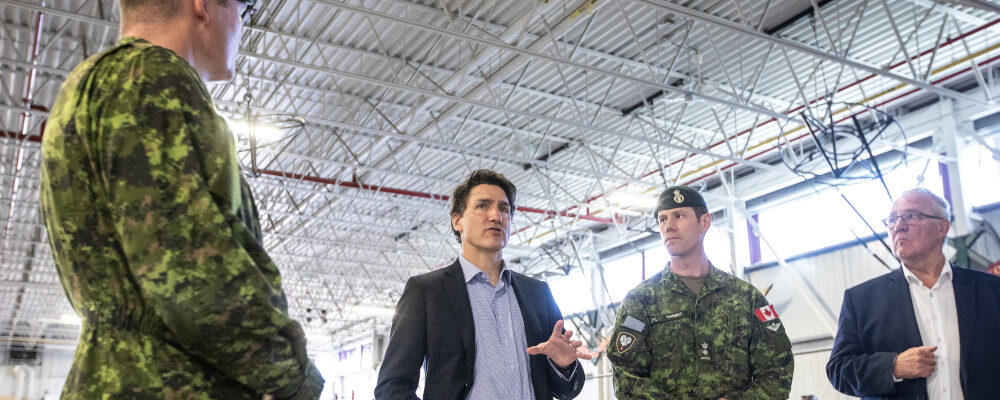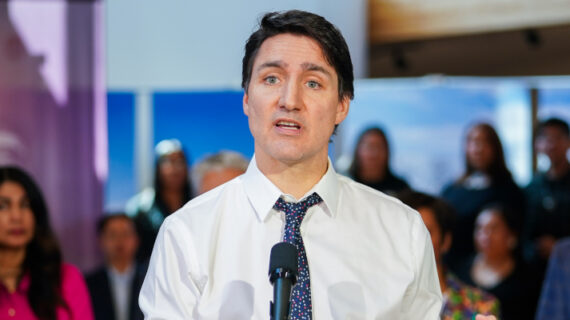The cabinet shuffle of several weeks ago that saw Anita Anand moved to the Treasury Board secretariat inspired a number of commentators to suggest that the government does not care about defence in large part because there is no large electoral constituency for the file.
The observation seems highly credible as a broad statement. Polling consistently rates defence and foreign affairs significantly lower than items like the economy, health care and affordability. An Ipsos poll conducted this past March about budget priorities found investing in the armed forces ranked 12th among other major priorities. Defence being a relatively low priority in the public sphere is not out of the ordinary among like-minded states, and there are other nuances to this area that bring into question the too-confident assertion that defence, therefore, does not actually matter as an issue.
Firstly, it is important to note that Canadians’ views on defence are not uniform. Where one stands in the political spectrum matters. Using the 2021 Canadian Elections Study Dataset, over 36 percent of Conservatives believed that more should be spent on defence, with 46 percent preferring the status quo. Only 18 and 11 percent of Liberal and NDP voters, respectively held the same view. There are significant differences between those latter two party supporters too. Approximately 20 percent of Liberal and 30 percent of NDP voters thought military funding should decline.
The 2021 dataset provides additional wrinkles worth considering. Overwhelming majorities of voters intending to elect Conservative or Liberal held the Armed forces in high regard—over 79 and 74 percent, respectively, said they had a “great deal” or “quite a lot respect” for the military. People who voted NDP however held the armed forces in a significantly lower regard, with barely 50 percent holding similar positive views.
This contrast between Conservative and Liberal views on military spending despite their high regard for the military is worth exploring. One explanation for the distribution is that Canadians have a generally poor understanding of the military’s role and its issues. Defence is unlike any other area of government—there isn’t a direct cost to Canadian voters’ pocketbooks like groceries, nor is it a government service that Canadians access directly like health care. It might be better likened to an insurance policy, and interest in defence tends to follow major foreign and domestic emergencies, such as the 2001 September 11th attacks or the 2022 Invasion of Ukraine.
Recent Ipsos polling for Global News suggests that Russia’s invasion of Ukraine and China’s aggressive moves in Taiwan are pushing Canadians to take defence more seriously. It is often in the wake of such events that governments’ security policies are more closely scrutinized by the populace—a perception that then feeds into broader perspectives about governance. Consequently, making a comparison between defence and a basket of other concerns likely fails to capture its actual salience to voters.1The political consequences of not spending on defence were evident after the ousting of the Taliban in 2001 with Canada’s initial deployment of troops to Afghanistan. This included the memorable television image of Canadian troops arriving into the arid Afghan environment in forest green uniforms and lightly armoured Iltis jeeps. It led the Chretien government to expedite the purchase of equipment to equip soldiers being deployed into the country. If defence truly did not matter to voters, then there would be no reason to immediately authorize an increase in funding.
Yet the problem is that defence requires long-term planning and investment to ensure that our armed forces have the capabilities required to undertake their missions. International crises require capability responses measured in hours, days and weeks. The timeline for developing said capabilities involving acquiring equipment, recruiting personnel, and training them on these systems takes years if not decades. Furthermore, defence also must compete with bread-and-butter domestic issues for resources and political support.
It is a tricky needle to thread. Especially as polling further suggests that Canadians who lean Conservative and Liberal both feel like Canada should play a strong role in international relations, even if they differ on how much spending needs to be allocated there.
Unfortunately, even here Canada is increasingly irrelevant.
Voters, however, lack understanding of what this engaged posture would require in terms of policy and funding. It speaks to the deficient defence literacy highlighted in an earlier column. One aspect is how many within the populace perceive UN Peacekeeping missions to be some sort of uniquely Canadian and helpful alternative foreign policy approach, despite the concept’s near irrelevance to major issues in international relations. There is no useful role for peacekeepers in Ukraine today (except to serve Russia’s interests) or even in Africa, yet Canadian politicians frequently invoke the practice to burnish their seriousness towards foreign relations.
This low information environment has worked to the benefit of Canada’s parties in the past. Voters were easily lulled by successive governments into thinking that the country was doing its fair share of the task, yet they did not commit the necessary funding to sustain the military properly. In many cases, the CAF was deployed at near unsustainable levels to show the country’s international commitment, but little funding was provided to procure the equipment necessary to then replace aging systems. That funding went to deficit reduction or other government programs, which has now left the military in a parlous state riddled with obsolete equipment. In a way, this is why the two percent NATO threshold, as imperfect as it may be, is a popular one for Canadians. It is an easy-to-understand metric by which to judge the government’s performance.
The harsh reality, though, is that the status quo is simply unsustainable. Perceptions and reality are on a collision course as world tensions rise and our capabilities continue to lag. So, where does that leave us now?
Projecting a potential Liberal Party position on defence for the next election, they will likely rely on a few key messages to paint as rosy a picture as possible. Mainly, reassurance that they have been doing enough. They will likely employ the well-worn talking points about having increased defence spending by 70 percent from 2015 to 2026, and highlight the deployment of over a thousand additional troops to Latvia in support of NATO’s eastern border.
The question is whether this will work considering much of the negative press surrounding the country’s military posture in the past year. Much of the spending has been on new commitments that have worn its equipment base down. The aforementioned Ipsos polling provides a critical insight on this matter: it found that 56 percent of Canadians see the CAF as “old and antiquated”. Similarly, an Angus Reid poll from June suggested that over 70 percent of respondents said they believe Canada was falling behind militarily. The messaging employed by the Liberal Party in the past may no longer be resonating with the public.

Yet doing any more on defence may also cost it votes. The Liberals under Justin Trudeau have made strong inroads with NDP voters in the last three elections. Keeping the Left flank fortified and in the fold is the only hope for the Liberals to stay in power. Yet it is these voters who are the most skeptical of the military and most avoidant of any new spending commitments on defence.2The Liberal Party’s 2014 campaign platform related to defence certainly courted these views. The cancellation of the F-35 was front and centre of their defence platform, burnished by comments about focusing on humanitarian assistance and not just “whipping out CF-18s” for international crises like in Iraq.
The Liberals, then, will in all likelihood stay Team Status Quo on defence. Will the Conservatives offer any hope?
In some ways, they also have little incentive to spare much attention to the issue. Rhetoric about rooting out foreign interference and protecting our democratic institutions is one thing, but actually dedicating hard dollars and cents to boosting defence spending may interfere with the party’s efforts to impose fiscal discipline. And with the Left already ceding the ground on defence, they may be reluctant to deviate from their main focus: the pocketbook issues that are gaining increasing salience and will surely be what the next election is centred around.
Despite this bind, it is still fairly evident that, though they may be broadly uninformed on details of defence, security, and international relations, these are still important-if-latent issues to the electorate. It would be a mistake to assume they can continue being indefinitely ignored, especially given recent polling on the matter.
Overall, the situation begs for politicians to do a better job of proactively making the long-term case for defence spending. They need to start disabusing notions that everything is fine and set the agenda instead of allowing the public’s apathy to lead on this issue. A tall order perhaps, but one that could reap lasting rewards, not the least of which is the fortification of our national security.
It’s true that Canadians have for too long assumed we are resting on a strong foundation that in reality has been eroded away. But when the real world intrudes—and it is increasingly intruding—the public will eventually wake up to the hard reality of our forces’ feeble capabilities, and Canadians will only stand to be embarrassed for so long. There is untapped potential in being the one to restore Canada’s credibility. A smart party would start to get ahead of the issue now.
There is also one critical perspective that has not been discussed thus far: that of Canada’s allies. While they cannot vote, they do have an outsized impact on Canada’s security and prosperity. This will be explored in the next column to come.




